DVLA’s Year in Industry programme is designed to give individuals looking to get into digital the chance to learn new skills and gain valuable experience in their chosen subject area.
This year marks the second successful completion of the scheme, where 4 students from Swansea University have completed their development and placement with the agency.
Today, we hear from them on how they’ve found the past 12 months at the agency. This year’s students include Jamie Quinn and Matthew Salter who worked as software engineers in the Emerging Technology Lab (ETL), Jonathan Lim who worked as a software development engineer in test and Ross Couch who worked in the communication and engagement team.
Introducing our students:

Jamie: I’m a student studying in my hometown of Swansea and completed the Year in Industry programme on my Software Engineering course. For my placement year, I was fortunate to secure a position at DVLA, working in the ETL.
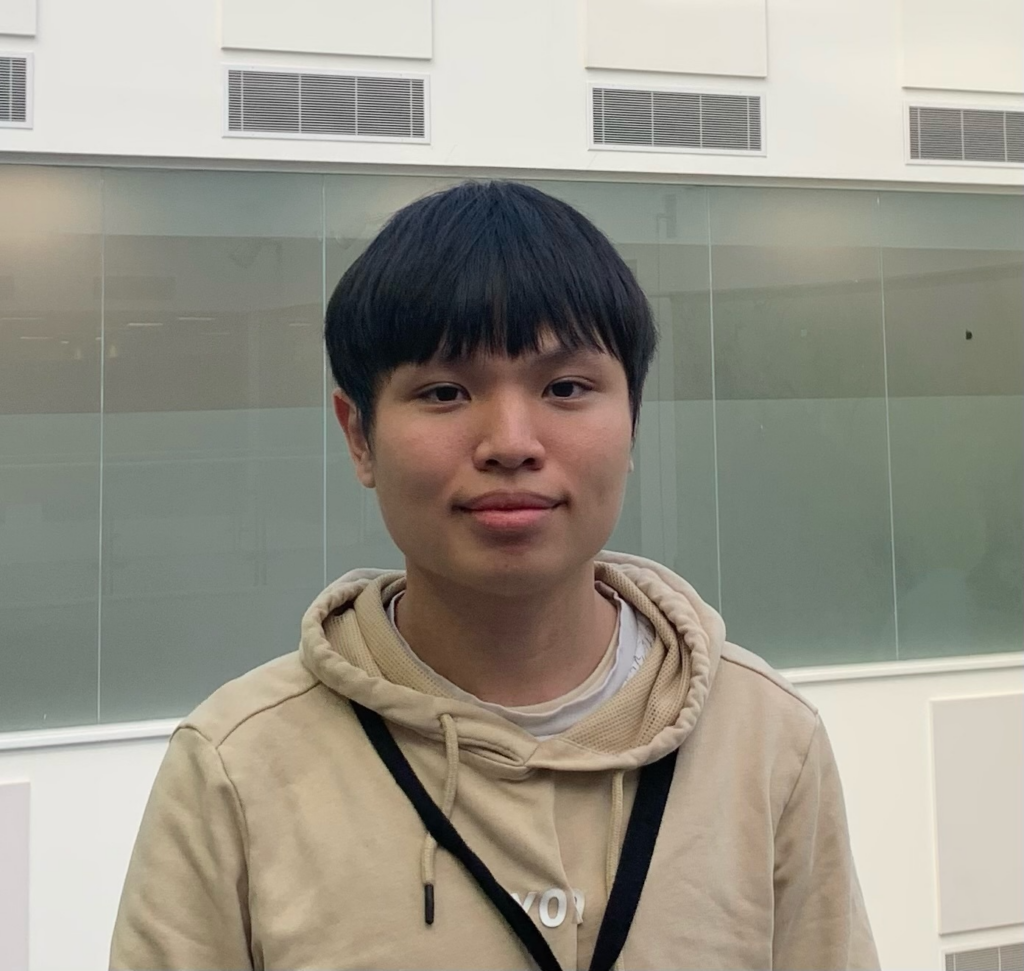
Jamie: I’m a student studying in my hometown of Swansea and completed the Year in Industry programme on my Software Engineering course. For my placement year, I was fortunate to secure a position at DVLA, working in the ETL.
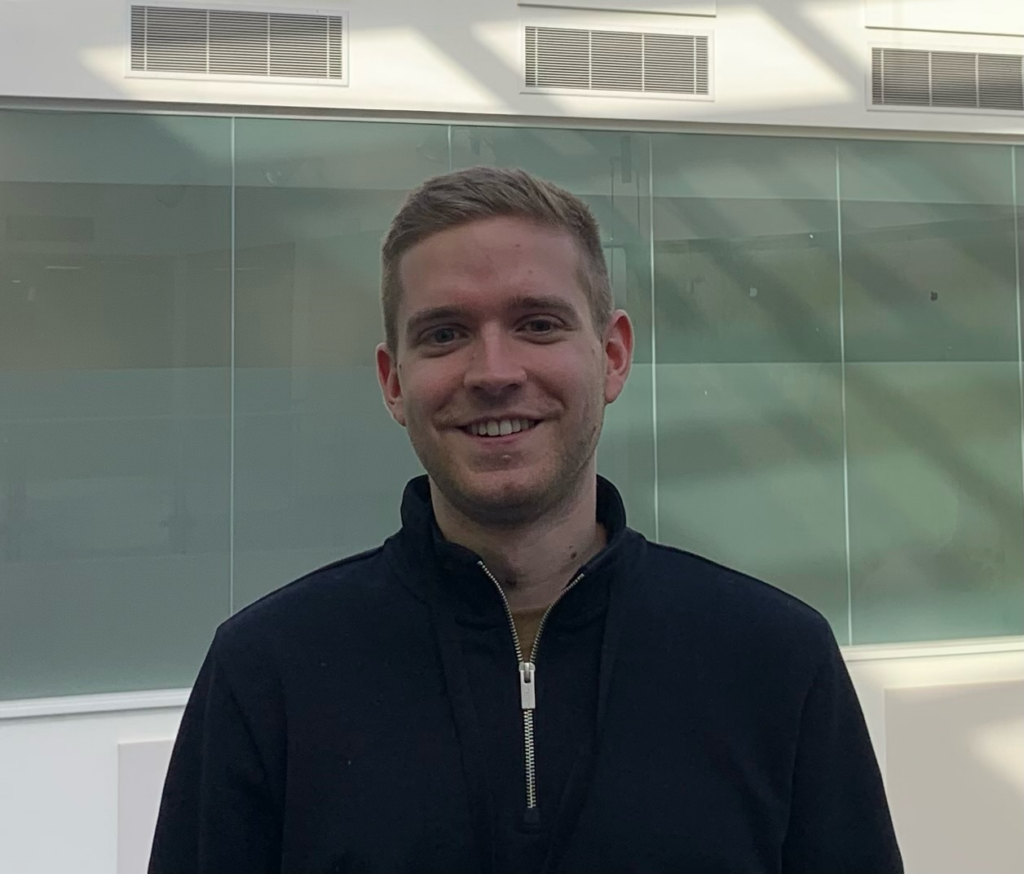
Matthew: I’m currently a student at Swansea University where I’m pursuing a degree in Software Engineering. Beyond my academic and professional pursuits, I have a keen interest in emerging technologies, cloud computing, and I enjoy exploring the latest in tech advancements outside of work.
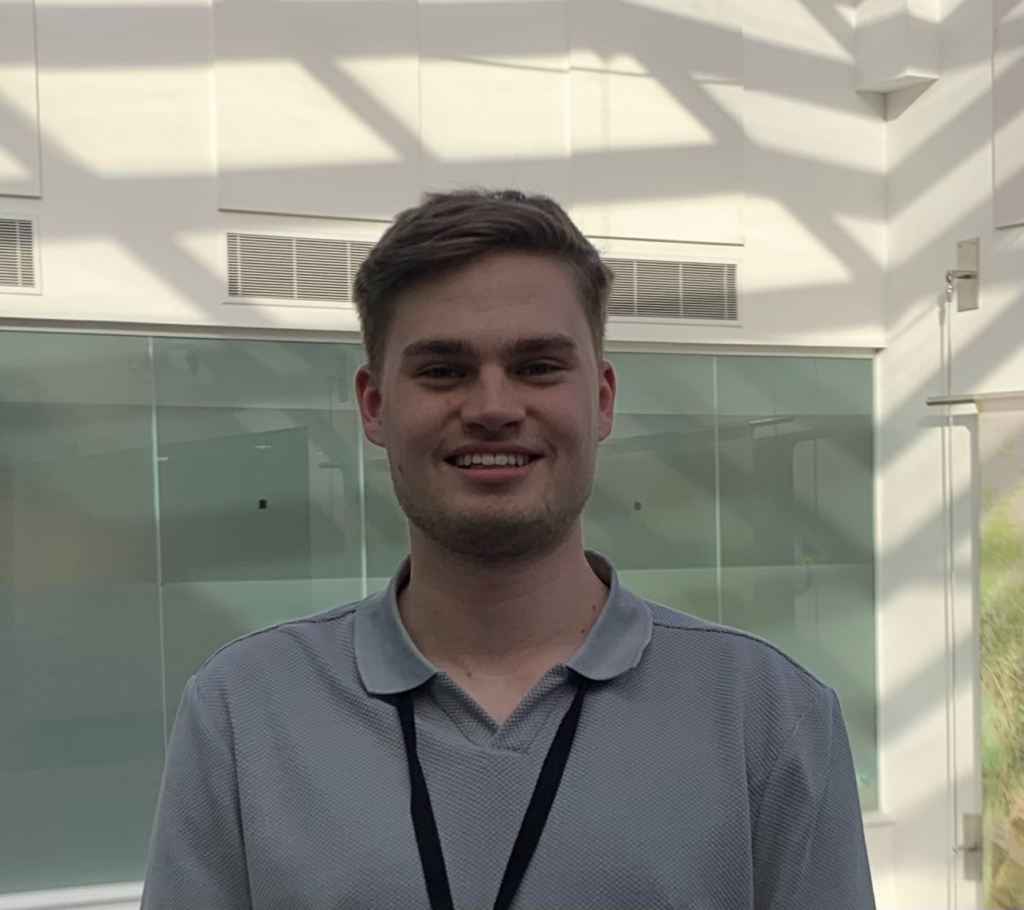
Ross: I’m a marketing student at Swansea University, originally from Cornwall, and took my placement in the ITS Communications team at DVLA. I enjoy following recent marketing and communications trends.
What skills have you developed at DVLA over the past year?
Jamie: Looking back, I can confidently say that I’ve grown significantly in various areas. My confidence has soared, particularly in presenting my work to others during our regular demo sessions. I was given the opportunity to develop a number of technical skills, becoming proficient in various programming languages such as Python, TypeScript, and React. I also honed my research and documentation skills using tools like Confluence. Overall, this experience has given me invaluable insight into professional software development practices and has helped me mature as a budding professional in the technology industry.
Jonathan: During my time at DVLA, I developed both professionally and personally. I’ve become proficient in various programming languages and have also had the chance to work with cloud-based platforms such as AWS (Amazon Web Services), Docker, and Drone pipelines, all of which are crucial tools often used in the software development industry. Beyond technical and professional skills, I gained the soft skills needed to work in a team.
Matthew: My technical skill set has expanded immensely, and I witnessed substantial growth in both my professional capabilities and personal confidence. This placement has pushed me to step out of my comfort zone, especially during presentations and hackathons, allowing me to become more assertive and keener in sharing my ideas. I developed my ability to adapt quickly to new technologies and methodologies, significantly boosting my problem-solving skills and technical agility.
I’ve gained hands-on experience with cloud platforms like AWS and Microsoft Azure, looking into serverless architectures, cloud services, and the deployment of AI models. My work with Generative AI and prompt engineering has been particularly exciting, enabling me to explore the fast-changing AI technology. I also developed my skills in full-stack development, working with technologies like React, TypeScript, and FastAPI, and contributed to open-source projects, enhancing my understanding of collaborative software development and version control with Git.
Ross: Looking back, I surprised myself with how quickly I adapted to the change from university to the workplace. I quickly integrated with the rest of the team who were all very welcoming and supportive. With DVLA being a large organisation and my role being communications focused, the nature of the job meant that I worked with a range of people from across the directorate.
After writing, editing and reviewing various communications articles over the 12-month placement, I’ve learnt how to write concisely and effectively. One of my main responsibilities was to manage the digital screens displayed around the office and I was given the freedom to design a range of screens which allowed me to develop my digital design skills using platforms like ScreenCloud and Canva. It was very rewarding seeing the quality of my designs improve over the course of the year.
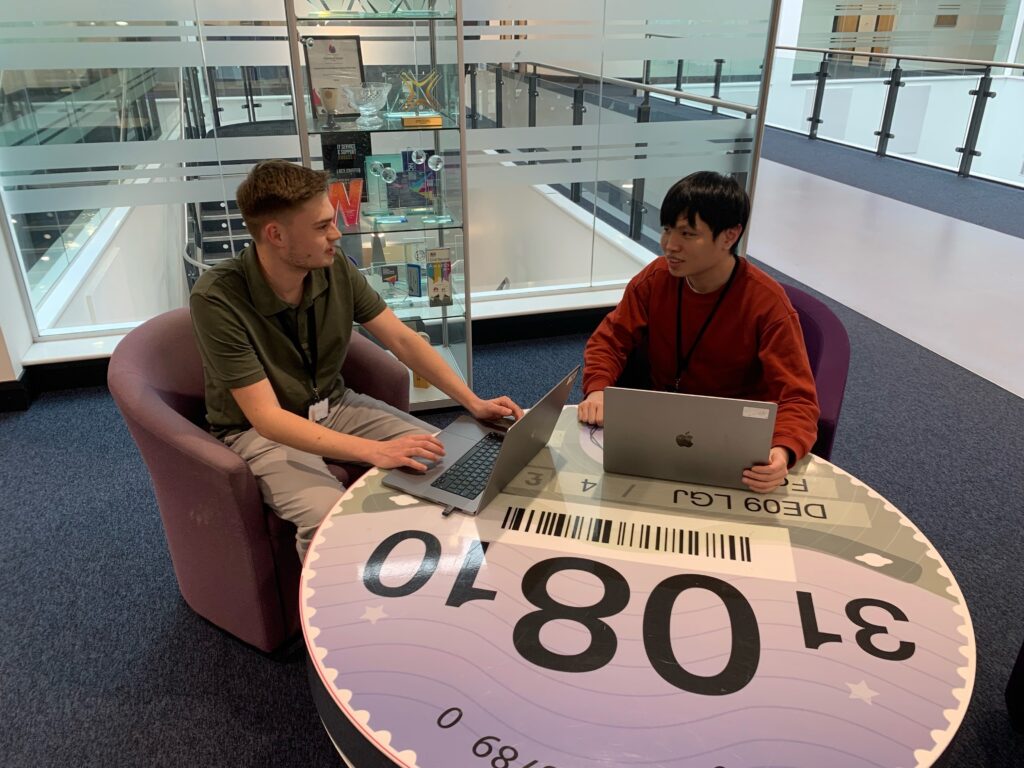
Can you tell us about some of the projects and tasks you’ve worked on over the past year and what that experience was like?
Jamie: Throughout my placement, I had the chance to work on a diverse range of projects and tasks. I started by contributing to a project for assessing driving licence photos online which involved documentation and minor code optimisations. This was a great introduction to the codebase and development practices. I then moved into researching and developing prototypes for Generative AI applications, which was incredibly exciting and eye-opening.
One of the highlights of my placement was participating in hackathons and AI meetups, including a Google-hosted event in London focusing on AI in the transport sector. These experiences provided valuable exposure to real-world problem-solving and allowed me to network with professionals in the field.
Jonathan: One of the more significant projects I worked on was exploratory testing. Software testing techniques like exploratory testing focus on identifying errors and defects that are difficult to cover through automation testing.
I used the x-ray exploratory app to test out session timeouts for the 10-year renewal service. Initially, I began by creating new exploratory testing sessions from my Jira (project management software) issue. During the sessions, I navigated through the application under test, noting any issues or observations within the app and providing detailed feedback. Detailed reports are then generated directly with Jira and after working with my peers we fixed the issues and completed a test report.
Matthew: Among the projects I worked on, 2 stand out: the Image Quality Check and the Generative AI project. The Image Quality Check project introduced me to the world of working with established codebases and serverless architecture, while the Generative AI project was a deep dive into cutting-edge technology, from prompt design to AI-generated content to explore its possibilities within DVLA.
Managing the Tech Lab Bot and contributing to the OpenCommit open-source project were also highlights, offering me a practical understanding of dependency management and collaborative coding practices. Presenting our Transport Hackathon idea at the Google/DfT AI Hackathon in London was a remarkable experience that showcased a real-world implementation of our AI work.
Ross: A key project that I worked on was the acronym campaign that I delivered across the directorate. I was tasked with developing a campaign to improve the use of acronyms and provide the meanings behind them. I took this from an initial idea and formed a campaign plan as well as delivering the campaign. I created a repository of acronyms where staff can go to find out the meanings behind over 400 acronyms. Working on this allowed me to gain an understanding of the fundamentals of running a campaign.
Other key tasks included attending various career fairs across the South Wales region to promote working in digital at DVLA. I got the chance to speak to students and sixth form pupils about the opportunities available to them at the agency which enabled me to work on my social skills and gain confidence in public speaking.
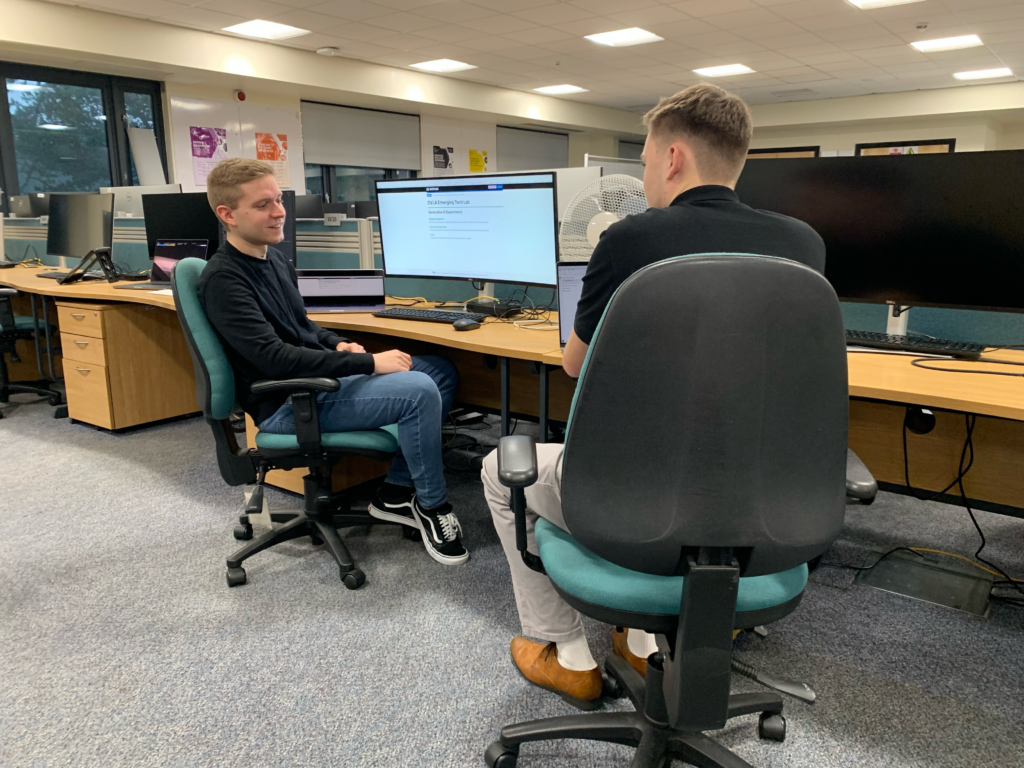
What advice would you give to other students looking to pursue a career in the digital profession?
Jamie: Based on my experiences, I would advise other students to remain open minded and willing to learn new technologies. The field is constantly evolving, and adaptability is key. Take advantage of every opportunity to attend events and network – the insights and connections you gain can be invaluable. Don’t be afraid to contribute to large projects, even in small ways. Every contribution is a learning opportunity and helps build your confidence. Embrace challenges and be willing to adapt to new programming languages and frameworks – versatility is highly valued in the tech industry. Always seek help and guidance from more experienced team members; their knowledge is a goldmine.
Jonathan: A tip I would give is to take your time when you’re starting. DVLA works with up-to-date advanced technology and processes so it can be complicated when you’re just starting out. Don’t hesitate to ask questions if you’re confused or overwhelmed, staff are always friendly and keen to help.
In your free time, I would start looking into version control, and if you have more time, AWS, Docker and Continuous Integration (CI) and Continuous Delivery (CD) as they are used in most industries. Doing that should give you a major head start in the future.
Matthew: For students looking to venture into the digital profession, my advice is to embrace opportunities that push you beyond your comfort zone. Whether it’s participating in hackathons, contributing to open-source projects, or presenting your work, these experiences are invaluable. Stay proactive in learning new technologies and methodologies, especially in areas like cloud computing and AI, which are rapidly evolving.
Networking is also crucial; don’t hesitate to reach out to professionals in your field of interest for advice and mentorship. Lastly, document your learning and projects thoroughly, as this not only aids in your understanding but also showcases your capabilities to potential employers.
Ross: My advice to students looking to get into digital would be to be open-minded and just go for it! Don’t look at a digital role and think you don’t have enough experience or that it looks ‘too technical’ or that it isn’t exactly was you are looking for. Be open to putting yourself out of your comfort zone and testing yourself. A strong desire to learn new skills and an interest in the subject area goes a long way.
Keen to find out more? Check out the development programmes that DVLA offers here.




